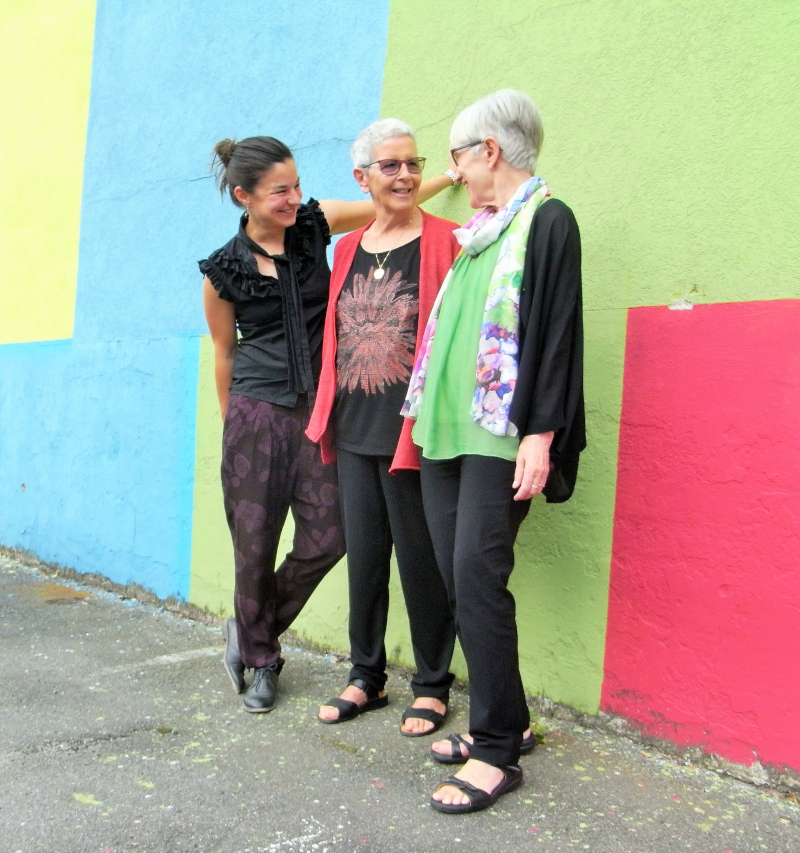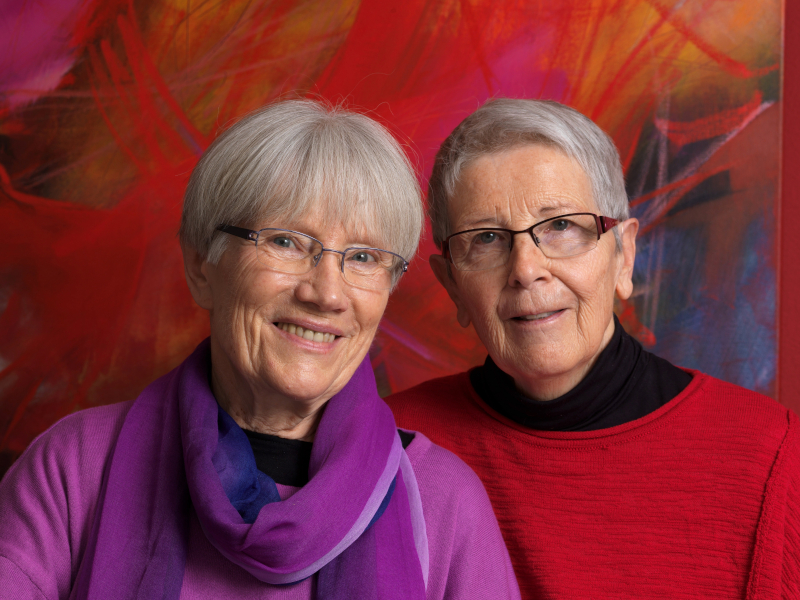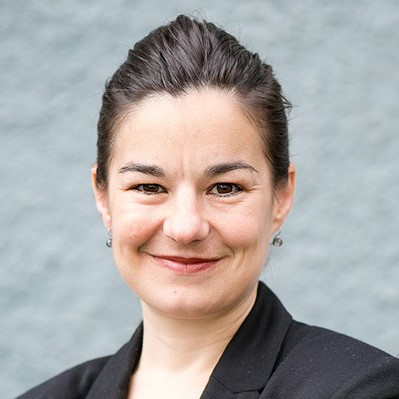_1 (800x500).jpg)
Corinne Rufli: It's the time to collect the memories of older lesbians and publicize them
An interview with Corinne Rufli, a Swiss historian and author, about her book featuring the life stories of 11 lesbian women over 70: After that Night, I Was Spellbound.
Corinne, we met in 2017 during the first EL*C in Vienna, in the panel on lesbian ageing. I was impressed by your book as well as by the number of older lesbians attending the event. It was an international event, so it’s hard to compare, but anyway, this attendance level would probably not be seen in the Czech Republic, where older lesbians are one of the least visible groups in the LGBT+ community.
What about Switzerland? If a lesbian conference were held in Zurich, would you see a comparable number of women over the age of 60 there as we did in Vienna?
The generation of feminist lesbians who were active in the women’s and lesbian movements of the 1970s are in their sixties today. In Switzerland, they are still active and out. They had fought for acceptance and visibility all their lives. They are claiming their rights. So they are seen at conferences and other LGBT events. But a huge difference emerges when talking about lesbians who are 70 and older. They disappear.
You are about half the age of the protagonists of your book. How did you come up with the idea of researching older lesbians?
As a young student, I was in love with the early feminists of the lesbian movement. Those were my heroines. I studied history at the University of Zurich and had already written papers on lesbian history. For my master’s degree, I first wanted to write about the lesbian movement in Zurich. But suddenly it hit me, and I started asking myself where the lesbians were who grew up before the social movements of the 1970s; women who lived in the conservative post-war 50s and 60s, a time when women in Switzerland were supposed to marry, have children, and adapt to being housewives. I wanted to find out how it was for women to love women then, what they remember about that time, and how they live today.

Historien Corinne Rufli (on the left) with partners Eva and Karin
Was it difficult to find respondents?
It is a generation of women that is not visible in our society, not even in the lesbian community. So yes, it was difficult. But there were enough women in my big circle of lesbian friends who knew older women who love women. So they helped me contact them – and surprisingly enough, every woman I asked to tell me her story was open and talked to me about her past and present.
Were they afraid to share their stories publicly?
The first step was my academic work – which was an oral history study for my master’s degree. This study was not published. After listening to those great life stories, I knew those voices had to be heard. So I decided to write a book with biographies. I asked the women if they wanted to be part of this book. Most of them were not initially delighted about my idea. They were used to keeping quiet, to being discreet about the “lesbian” part of their lives. But they all said yes, except for one woman. And today they are proud to be in the book.
What was their motivation to do so?
Well, nobody would have thought that the book would be so successful, not even me. So we were all surprised about the big interest of the media and readers. Some of the protagonists of my book told me that they wanted to encourage other women, other lesbians, to go their own way, to follow their hearts. For others, it felt like finally saying something aloud that had never really clearly been told.
How did they deal with the sudden public interest?
Some gave interviews in big Swiss newspapers, on TV, or on the radio; others came along with me to the readings. Some didn’t want to talk in public. I totally accept every person’s decision. It was great for me that their families and friends also read the book, and often this brought new perspectives and openness to their relationships, because some women told me that they hadn’t ever really talked openly in the family or in their circle of straight friends about being lesbian. It brought acceptance and reconciliation.
What was special about talking to those women?
I never knew what to expect before I met the women. Even though most of them said, “My life story is not worth telling,” they told me amazing stories. Imagine: I’m sitting in front of an 85-year-old woman, and she tells me intimate secrets of her life. Or she cries. Or she smiles because she thinks back to her first love or kiss with a woman. Those are great moments. The women gave me a wonderful gift by telling me their stories. They are all unique and have their own ways of talking about their lives.
Why did you decide to make a book out of the historical study?
See above
When your book was published, what were the reactions to it (in the community, from the general and professional public)?
The response was amazing. Almost all the big Swiss daily newspapers wrote about it. The interest was surprisingly huge. I did not expect that. I thought, Well, the book is out now, I can go finally back to working and earning money again. But the opposite happened.
Reactions: The community was so supportive! I got so many letters, e-mails, and direct feedback. The older women said: Finally, I feel represented, and the young generation was surprised to make a connection between the generations of lesbians.
Many people were just surprised that there even existed a lesbian generation at that age. For many, it was unimaginable. We all have our prejudices about what older women are like. And mostly we don’t think of them as homosexual.
What lessons could be learned from the book by the non-LGBT population? What is the relevance of this topic for them?
One thing the stories have in common, even though they are all so different: Follow your heart, be courageous, find out what is good for you, and think positive. Those are elements that are important for every human being. And many straight readers, men and women, saw this connection between the women in my book and their own lives. So everybody can relate to those stories, and identify with either this or that story.
What lessons did you learn? Has your work on the book influenced your plans for getting older?
I have learned so much in the past three years. First of all, I learned from the personal contact with this generation of women to accept each woman as she is, whether she calls herself lesbian or not, whether came out very late, or even lives her life with a man, because she couldn’t live as she wanted. I gained a unique insight into “my” past, into what it meant to love a woman 50 or 60 years ago.
And it was very important to me to see what ageing as a lesbian could look like. To see the different forms of living: together in the same household for more than 40 years; in a relationship but not living together, enjoying the freedom that comes along; changing partners throughout life; not having a partner and looking for one even at 80; or feeling happy alone and having a circle of good friends.
My straight grandparents can be role models, too, but the shared experience of loving a woman makes the older lesbians amazing role models for me – and for many others.
What does research on that topic do to you as a younger lesbian activist?
First of all, I see how great the need for research is. Because – in Switzerland – there is no research on the time between 1940 and 1970. And before that, too, little is known. We know that lesbians and gays were organizing themselves in the 1930s in Zurich.
In other words: lesbian history is part of history. And ignoring that, and refusing to financially support academic research, is part of the heteronormative pressure and discrimination on all of us. Not having a “history” makes every generation start all over without role models. And I am putting my energy into changing that, into researching and making lesbian history visible, in all its plurality and diversity.
Are ageing, illness, health and social care facilities, home care, death and dying and the LGBT+ community issues that are openly discussed in Switzerland? Could your book help in this?
Very gradually, ageing is starting to be an issue. Germany and its activists are a lot further along on that topic, so I profit from their knowledge. There is a new Queer and Age initiative in Switzerland. I can’t tell if my book has had direct consequences. But at least with my book there is the “evidence” of the existence of that lesbian generation.
What are your future plans?
I applied for financial support for writing my dissertation. I am still waiting for an answer. My lifeblood are older lesbian women in Switzerland and their stories. And it’s urgent! Now is the time to collect the memories of older lesbians. If not now, it will be too late! And so many voices will be silenced forever.
I’ve read that your book might be translated into Chinese.
It was just an amazing stroke of luck to have a young Chinese lesbian take responsibility and find two – also young Chinese – translators. So the book is finished, it only has to be printed!
You can wonder if it is a bit strange to have the stories of Swiss lesbians translated for China – but interestingly enough, the young Chinese lesbians told me that they could easily identify with those stories, because many things today are for them the same as it used to be in Switzerland 40 years ago. So why should the Swiss seniors not be roles models for young Chinese lesbians?
Who knows if there might also be an interested Czech publisher?
What are your hopes for the future fate of your work and for lesbians getting older all over the world?
I can never speak for “lesbians all over the world” because the structures in every country are so different. And our Western idea of what a lesbian is like can never be translated to non-Western countries. But in general, I hope that lesbians getting older get the respect and freedom to live their lives as they want. That they are represented in media and have the same legal rights as anybody. That there are places where older lesbians can meet, laugh, and fall in love. It’s also important that there are nursing homes where lesbians can be open and feel comfortable. And: good and loving intergenerational contact between lesbians.
Happy for 40 years. Who are Karin (80) and Eva (77)
Karin (80) and Eva (77), two of the protagonists of your book, are coming with you to Prague and we will have a chance to talk to them on 10 August in Život90.
Karin and Eva have totally different backgrounds. They met around 1980, when they both were 40. Since then, they have shared their lives together. Eva grew up as the oldest with four brothers in a very narrow evangelical surrounding. She was told to dedicate her life to God, to live a moral life, to marry and have children. So she did. She became the wife of a protestant minister and had to represent the perfect upper-middle class housewife. She was a teacher before she had her children and then she was bound to her role as a mother. After a couple very heavy incidents melted her perfect façade, she almost had a nervous breakdown. She knew she didn’t love her husband, but she didn’t know why, with all the pressure on her, she was not capable of being as “good” a mother as expected. After therapy, she started on a new education path. And that’s where she met Karin.

Karin (in contrast to Eva) always knew she loved women, but she had no words for that. She felt like she was not normal. She had her music and art, which helped her to get over that feeling. Her first love with a woman in the early 1960s was lived in secret and so it had no future. She often felt alone, until she met Eva. Very gradually, they fell in love with each other. Eva left her family and started a new life with Karin. The feelings of guilt for leaving the children with their father have never really gone away. But it was her only chance to survive. Today the two of them have a very caring and respectful relationship. They have had an interesting process, from upper-class women, with no need or interest in meeting other lesbians, not even using the word lesbian, and having a circle of straight friends, to suddenly coming out in my book and being willing to talk openly about their relationship. And they have accompanied me to countless readings and have suddenly become role models for different generations of lesbians; they are in close contact with many lesbians and find that the very part of themselves of which they felt not really ashamed but certainly not proud, has suddenly become a big point of interest for so many people. And they found that by telling their story they already have encouraged so many women. It’s just a great pleasure to be on the road with Karin and Eva.

Historien Corinne Rufli
Corinne Rufli (38), Switzerland
Studied history and German language and literature at the University of Zurich, completing her degree with an oral history study of older lesbian women in Switzerland. In 2015, she published a book with the life stories of eleven women over 70 loving women: After that Night, I Was Spellbound. The book was discussed in newspapers, on television, and on radio shows in all the German-speaking countries. Rufli was invited to give lectures in Switzerland, Germany, and Austria; she has been on tour for the past three years, accompanied by some of the women featured in her book. The fourth edition was just released. The book will soon be published in Chinese.
In addition to her research on lesbian history in Switzerland, she works as an editor of a culture magazine.
Corinne Rufli is active in many lesbian projects, including historic walks through lesbian history in Zurich, Sappho Verein, and the L-World-Wiki at www.lesbengeschichte.ch.
Corinne, Eva and Karin’s visit to Prague Pride 2018 is organized by PROUD z.s. (under its LGBT+ ageing programme) in cooperation with Prague Pride z.s. and Život 90 z.s.
English edited by Anne Johnson (This email address is being protected from spambots. You need JavaScript enabled to view it.).



